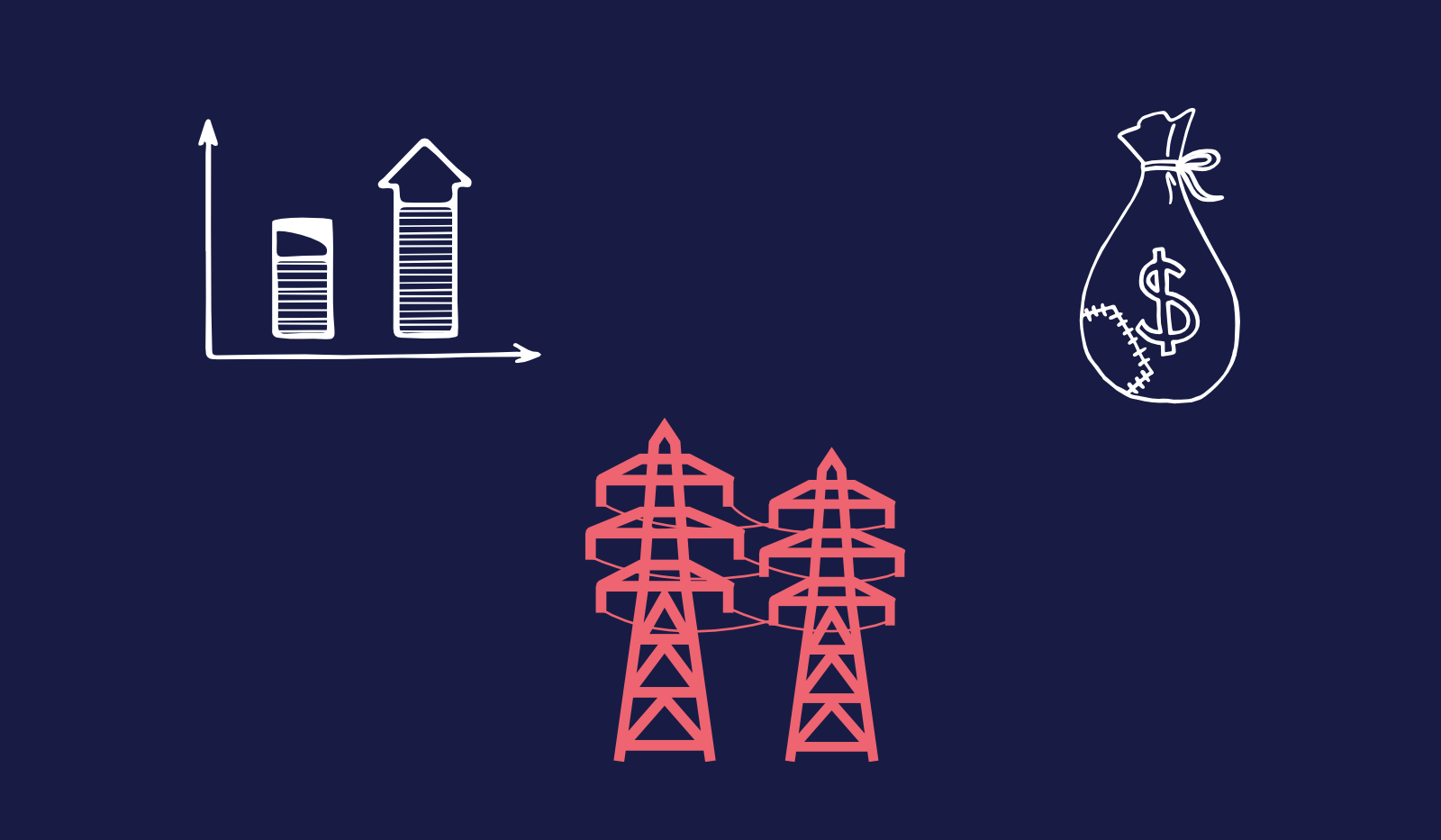
Vienna Calling
Pola Schneemelcher, Max Krahé
Last week we held our second European Macro Policy Network (EMPN) conference. After the first meeting in Rome, hosted by Sapienza University in March, Philipp Heimberger and the Vienna Institute for International Economic Studies (wiiw) welcomed us to Austria. Keynote speeches were given by Jakob von Weizsäcker, Minister of Finance of the Saarland, and Jeromin Zettelmeyer, Director of Bruegel. This newsletter summarises the proceedings.
 At the end of 2021, we founded the European Macro Policy Network (EMPN). Last week, we came together for our second EMPN conference, hosted by the Vienna Institute for International Economic Studies (wiiw) in Vienna. With over 150 participants across two days, it was a great opportunity to mingle, discuss and reflect together on the economic, political, and climate-change-related challenges currently facing Europe.
At the end of 2021, we founded the European Macro Policy Network (EMPN). Last week, we came together for our second EMPN conference, hosted by the Vienna Institute for International Economic Studies (wiiw) in Vienna. With over 150 participants across two days, it was a great opportunity to mingle, discuss and reflect together on the economic, political, and climate-change-related challenges currently facing Europe.
We would like to thank Philipp Heimberger and his team, who made everyone feel welcome, facilitated open and productive discussions – and treated us to excellent Austrian cuisine. We would also like to thank the Vienna Chamber of Labor for making their impressive conference venues available to us.
The first Day: Deepening Ties
As at our first meeting in Rome, the first day was for EMPN members only.
The EMPN is a pan-European network dedicated to deepening intra-European debates around fiscal, monetary, and economic policy. It connects thirteen organizations in seven European countries, among them think tanks — e.g. Arena Idé in Sweden, the Institut Avant-garde in France, or the Instituut voor Publieke Economie in the Netherlands —, teams of researchers — e.g. at JKU Linz in Austria and TU Chemnitz in Germany — as well as NGOs and foundations — e.g. Fondazione Giacomo Brodolini in Italy or Fiscal Future in Germany. With its outstanding experts, member organizations that are credibly rooted in their respective national contexts, and a shared commitment to improving Europe’s macro-financial architecture, the EMPN is a unique link between European and national debates and decision-making spaces.

The first day deepened and strengthened personal ties within the network. The members gave each other an overview of their work — from how to think about climate debt via reflections on industrial policy to the potential identification of a new school of thought — and caught up with each other.
The second Day: Fiscal Policy for the 21st Century – Meeting Economic, Social and Climate Challenges
The second day was public and consisted of three keynote speeches and panel discussions. Given the programme’s focus on fiscal policy, the recent ruling by the German Constitutional Court gave the conversations extra urgency. The day was broadcast via livestream and can be re-watched here.
 After welcome speeches by Philipp Heimberger and our own Philippa, the day began with its first highlight, a keynote from Jakob von Weizsäcker, State Minister of Finance of the Saarland. Jakob explained how he set up a 3 billion euro transformation fund, to give firms and the public sector in the Saarland the necessary support to meet their climate targets, while ensuring both compliance with the state’s strict fiscal rule and the preservation of the Saarland’s industrial ecosystem.
After welcome speeches by Philipp Heimberger and our own Philippa, the day began with its first highlight, a keynote from Jakob von Weizsäcker, State Minister of Finance of the Saarland. Jakob explained how he set up a 3 billion euro transformation fund, to give firms and the public sector in the Saarland the necessary support to meet their climate targets, while ensuring both compliance with the state’s strict fiscal rule and the preservation of the Saarland’s industrial ecosystem.
 This was a Länder-level answer to the “triangle of sustainability”-challenge: balancing fiscal, political, and climate sustainability. At the German and European level, he proposed a three-part solution: a special transformation fund, similar to the 100 billion euro special fund for the German Bundeswehr; reforming the German debt brake when feasible; and a European vehicle building on Next Generation EU.
This was a Länder-level answer to the “triangle of sustainability”-challenge: balancing fiscal, political, and climate sustainability. At the German and European level, he proposed a three-part solution: a special transformation fund, similar to the 100 billion euro special fund for the German Bundeswehr; reforming the German debt brake when feasible; and a European vehicle building on Next Generation EU.
In the panel discussion that followed, Helene Schuberth (ÖGB), Georg Feigl (Arbeiterkammer Wien) and Dario Guarascio (Sapienza University of Rome) responded to Jakob’s presentation. The session was moderated by Mario Holzner, executive director of the wiiw.
After a short coffee break, Jeromin Zettelmeyer, director of the Brussels think tank Bruegel, gave the second keynote, explaining and analysing the Debt Sustainability Analysis (DSA)-based reform proposals currently under discussion in the EU fiscal rules reform process. While Jeromin praised some of its aspects, he critiqued the latest proposals’ lack of ambition and transparency. His proposal to fix the identified flaws zoomed in on the so-called “safeguards”, rules prescribing minimal quantitative adjustments on top of the DSAs. He argued for a fiscally responsible green golden rule (find out more here) as his preferred landing zone. The subsequent audience Q&A was moderated by Philippa.
 Jens van ‘t Klooster, Assistant Professor of Political Economy at the University of Amsterdam, kicked off the afternoon session with a talk on how to manage public debt in the context of climate change. He highlighted that existing institutions are unprepared for the challenges of the Anthropocene era, particularly due to a lack of coordination between the ECB and EU fiscal authorities. Jens suggested increased coordination as the way forward, proposing measures such as ending the haircut penalty for EU supranational debt or having the ESM serve as a credit rating agency for sovereigns. Clara Leonard (Institut Avant-garde), Johannes Holler (Fiscal Council Austria) and Paul Pichler (University of Vienna) discussed his points, with Philipp Heimberger moderating the conversation.
Jens van ‘t Klooster, Assistant Professor of Political Economy at the University of Amsterdam, kicked off the afternoon session with a talk on how to manage public debt in the context of climate change. He highlighted that existing institutions are unprepared for the challenges of the Anthropocene era, particularly due to a lack of coordination between the ECB and EU fiscal authorities. Jens suggested increased coordination as the way forward, proposing measures such as ending the haircut penalty for EU supranational debt or having the ESM serve as a credit rating agency for sovereigns. Clara Leonard (Institut Avant-garde), Johannes Holler (Fiscal Council Austria) and Paul Pichler (University of Vienna) discussed his points, with Philipp Heimberger moderating the conversation.
 The day concluded with a panel (in German) on interdisciplinary perspectives for progressive fiscal policy. Lukas Oberndorfer (Vienna Chamber of Labour) covered climate financing, Lea Steininger (wiiw) discussed the connection between fiscal policy and full employment, Margit Schratzenstaller-Altzinger (WIFO) addressed tax policy, and Oliver Picek (Momentum Institute) explained the stabilization role of modern fiscal policy. Kurt Bayer (wiiw) moderated the panel.
The day concluded with a panel (in German) on interdisciplinary perspectives for progressive fiscal policy. Lukas Oberndorfer (Vienna Chamber of Labour) covered climate financing, Lea Steininger (wiiw) discussed the connection between fiscal policy and full employment, Margit Schratzenstaller-Altzinger (WIFO) addressed tax policy, and Oliver Picek (Momentum Institute) explained the stabilization role of modern fiscal policy. Kurt Bayer (wiiw) moderated the panel.
The months ahead
This marked the end of an exciting and timely EMPN conference. In the months ahead, the EMPN will continue doing what we did during the conference: connect European economic questions with national political realities. This builds on the progress made since our first meeting in Rome six months ago: Institut Avant-garde in Paris, had its public launch, covered in Les Echos (roughly the French Financial Times), and published its first papers and articles, including an interview with Xavier Jaravel and two op-eds in Alternatives Economiques. Our partner organization in Finland, UTAK, also had its public launch and was featured in the most important daily Finnish newspaper, Helsingin Sanomat. The transnational aspect of the network was equally on display in recent months: Donato di Carlo, founder and director of our partner organization LUHNIP, gave an interview to the German newspaper Die ZEIT, and together with IPE, our Dutch partner, we published first results from joint research on linking fiscal- with climate commitments.
We are also delighted that we could secure further funding for some of our partners, including Philipp Heimberger and his team at the wiiw, IPE, and Fiscal Future, and thus continue to support their excellent work. Additionally, we have established a coordination position for the EMPN, overseeing operations and network development, which Pola Schneemelcher assumed in early June. We thank Partners for a New Economy for funding this position.
Our next steps will be to launch a dedicated EMPN website to make the network and our partner organizations even more visible and accessible. Finally, the next conference is just around the corner: Spring 2024 in The Hague, in the run-up to the European elections!
Reading recommendations:
In line with this newsletter’s focus on the EMPN, today’s reading recommendations come in a variety of languages:
- English: Our Italian partner organization LUHNIP publishes a monthly briefing on European industrial policy, offering deep dives on focus topics, a recap of recent policy development and events, and guest contributions. We highly recommend it!
- French: Our French partner organization Institut Avant-garde talked to Xavier Jaravel, Associate Professor of Economics at the LSE, about his book “Marie Curie habite dans le Morbihan” and his new approach to innovation. Following our conference, they also published a summary of Jens van ‘t Kloosters presentation at the EMPN
- German: Donato di Carlo (LUNHIP) talked to Die ZEIT about the Italian Reddito di cittadinanza, a conditional minimum income that the current government is abolishing. His main take-away: The abolition will mainly affect people in the South of Italy, further weakening the region’s economic development. Politically, social discontent is a likely consequence.
- Dutch: Coming from the Netherlands is a comment in De Telegraaf by IPE’s Jasper J. van Dijk. It highlights the extraordinary bureaucratic burden that the current Dutch social security system imposes both on the state and on recipients, leading to stressful repayment obligations and high administrative expense.
Media Report 30.11.2023
- Media mentions
- On November 15, 2023, our reform proposals for the German debt brake were mentioned in UBS’s European Economic Comment.
- On November 23, 2023, Philippa was quoted in the Süddeutsche Zeitung.
- On November 24, 2023, Die Zeit mentioned our reform proposal for the cyclical component of the German.
- On November 26, 2023, Max was quoted in the Tagesspiegel regarding the debt brake.
- On November 27, 2023, our Open House webinar with Prof. Dr. Helge Braun, Member of the Bundestag, on the 2024 German budget took place. For those who missed it (and speak German), the recording of the event is here.
- On November 28, 2023, Max participated in the New Economy Short Cut of the Forum New Economy and discussed Quinn Slobodian’s new book Crack-Up Capitalism with the author.
- On November 29, 2023, Philippa was on the Bayern2 radio show radioWelt, discussing the current debate on the German budget.
- On November 30, 2023, Felix and Max published an article “The renewable answer to Europe’s fossil-fuel inflation” in Social Europe.
- On November 30, 2023, an interview with Max on the reform of the debt brake was published in the RND.
The Geldbrief is our newsletter on current developments in economic, fiscal, and monetary policy. We appreciate your feedback and suggestions. Send it to pola.schneemelcher[at]dezernatzukunft.org
Hat dir der Artikel gefallen?
Teile unsere Inhalte



